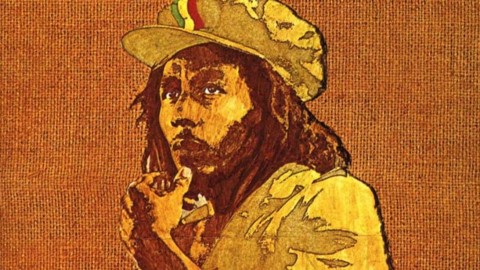Top 10 Bob Marley Songs

#10: “Get Up, Stand Up”
Burnin’ (1973)
Bob Marley had strong political views, and he made sure we knew about them through his music. This reggae track off Burnin’ is no exception; it’s been said “Get Up, Stand Up” was written after he saw Haiti’s poverty with his own eyes and is meant to describe how they lived as opposed to how they could live. Both the depth of the lyrics and its catchy rhythm make this song an absolute classic – and a message to mankind.
#9: “Exodus”
Exodus (1977)
One of Marley’s biggest concerns was that many people lived in a system that oppressed them, and he was particularly moved by the Jamaican elections of the mid-‘70s. In the title track to “Exodus,” the singer-songwriter speaks of how they can do something about their situation by ceasing to live unconsciously and by enjoying decisions of their own. His words were clearly acknowledged, as demonstrated by the fact that the intense number became a chart-topper in his native land as well as in England and Germany.
#8: “I Shot the Sheriff”
Burnin’ (1973)
This is an ode to justice, both literally and symbolically. In this reggae track, the narrator is accused of murdering the deputy even though he has openly admitted to having killed the sheriff. By talking about trying to silence those who fight for everybody’s rights and ideas, Marley is giving the voiceless a voice, and that’s a big part of why this song’s so special. Meanwhile, Eric Clapton’s successful cover the next year solidified its status as an enduring classic.
#7: “Buffalo Soldier”
Confrontation (1983)
This song is based on the real-life African-American cavalry regiments that fought during the Indian Wars post-1866. Recorded during Marley’s last-ever studio session in 1980, “Buffalo Soldier” imagines the army members as men battling for their lives. Thanks to a mighty message, it’s been covered multiple times. Then there are lyrics like, “If you know your history, then you would know where you coming from” – now, that’s a lesson to learn.
#6: “Redemption Song”
Uprising (1980)
This is one of the most powerful and popular songs Marley ever came up with. By inviting us to think about our life through deep ponderings, he makes us wonder why we sometimes take our environment as something prefabricated and inevitable. Uprising’s album closer is even more poignant considering it was written shortly following the musician’s cancer diagnosis. Then, there’s the fact that “Redemption Song” is just basically Marley and an acoustic guitar – it’s effective, influential and unique.
#5: “Could You Be Loved”
Uprising (1980)
Marley wrote about many different topics throughout his lifetime, including love, civil rights, justice and freedom. On “Could You Be Loved,” he tackles morality and judgment while incorporating some disco elements into his reggae style. A top 20 track in many European countries, the Uprising tune has also found a home in various movies.
#4: “Three Little Birds”
Exodus (1977)
Even though it was written in the ‘70s, its message applies to our modern world too: despite our worries and tense, fast-paced lives, Marley tells us no to “worry ‘bout a thing, ‘cause every little thing is gonna be all right.” And though the three little birds of the title have never been fully confirmed, this does nothing to take away from the roots reggae number’s sound and comforting words. The Exodus track went on to chart within the UK top 20 and inspire many other artists to cover it.
#3: “One Love / People Get Ready”
Exodus (1977)
Thanks to its central theme of love and its ability to bring people together despite our differences, this Bob Marley & The Wailers number continues to stand the test of time. With its roots reggae and R&B flavors, “One Love” was also credited to Curtis Mayfield after the band re-recorded the melody for “People Get Ready,” which he wrote for The Impressions. It may be less than 3 minutes long, but that’s all that’s needed to relay its message for future generations and get across its unforgettable spiritual vibe.
#2: “Jamming”
Exodus (1977)
In this Exodus number, Marley speaks of the Rastafari concept of “I and I,” which is oneness with others under the love of God, or Jah. Jamming is the act of getting together, having a good time and bonding with others. No wonder it was so popular. Adding further credence to this song’s strength is the fact that Marley’s performance of the track during the One Love Peace Concert made history when he successfully invited two Jamaican political competitors to join hands and “jam together” with him on stage.
Before we unveil our top pick, here are a few honorable mentions:
- “Is This Love”
Kaya (1978)
- “Waiting in Vain”
Exodus (1977)
- “Stir It Up”
Catch a Fire (1973)
- “Africa Unite”
Survival (1979)
- “Roots, Rock, Reggae”
Rastaman Vibration (1976)
#1: “No Woman, No Cry”
Natty Dread (1974)
Marley believed very strongly in the importance of one’s roots and that we shouldn’t ever forget them. This could be seen and heard through the lyrics of his songs. Though “No Woman, No Cry” is credited to Vincent Ford, it was still a song he felt deeply about. Describing the ghetto life and trying to convince a woman not to shed any tears, this Natty Dread song is hopeful and inspirational. It’s not only popular because of its melody, but also because of what it says and who says it. The version performed at London’s Lyceum Theatre in 1975 is especially well-known; appearing on both the Live! and Legend albums.
Do you agree with our list? What’s your favorite Bob Marley song? For more entertaining Top 10s published daily, be sure to subscribe to WatchMojo.com.
